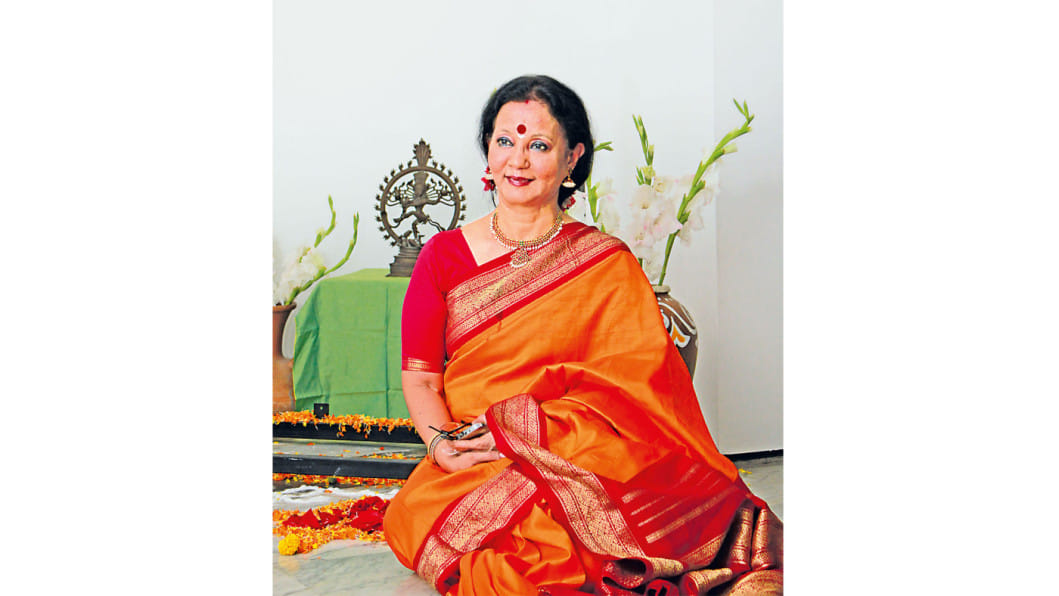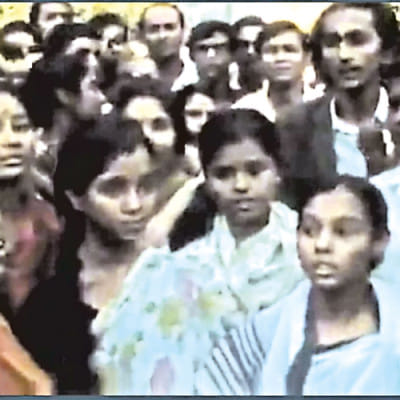The first time our flag was hoisted, we were in tears: Sharmila Banerjee

Eminent dancer Sharmila Banerjee is the lead Manipuri instructor at Chhayanaut Sangeet Bidyatan. She also spearheads the dance school, Nritya Nandan. During the Liberation War of Bangladesh in 1971, she alongside her family were forced to flee to India, as their home in Raozan, Chattogram was completely destroyed.
She was one of the witnesses of the uplifting of the flag of Bangladesh at the Pakistan high commission on December 6 for the first time in history, after Indira Gandhi recognised Bangladesh as a nation.
The Daily Star caught up with the artiste to listen to the memories of those days.
"Within just a few days of the beginning of the war, Chattogram was under attack. On the midnight of April 28, when we wee already robbed and in the same clothes for ten days, our village home was destroyed.
Finding no other way, we started walking towards Betbunia hill in Rangamati, and walked 85 Kilometers in just two days. I was with my 75-year-old Thakuma (grandmother), my Kakima (aunt) who was eight months pregnant, and 36 other family members with three hundred people from our village. We did not have any food with us. However, we then crossed the Subroon border and reached Agartola. From there, we went to Kolkata by train.
In May, artiste Swapan Chowdhury informed us that they have formed an association 'Mukti Sangrami Shilpi Sangstha' with Sanjida Khatun, Wahidul Haque along with Mahmuduzzaman Benu, and Debabrata Chowdhury among others. We were invited to join them. After that, we went to 144 Lenin Sarani, which was made the office for practice and rehearsals.
Noted intellectuals of Kolkata like Nirendranath Chakraborty, Dipendranath Bandyopadhyay, Debesh Ray, Shankha Ghosh, Proshun Basu, and Amitabh Dasgupta supported us dearly, and they were in the committee as well.
While Dalia Noushin, Sharmin Morshed, Rafiqul islam, Kalyani Ghosh, along with Tareq Ali, Enamul Haque, Syed Hasan Imam, Shahin Samad, and Shila Momen were the members of 'Muktir Gaan'.

The association decided to hold a fundraising concert for the artistes to create awareness. We decided present "Rupantorer Gaan" on stage which was written by Shahriar Kabir, and narrated by Syed Hasan Imam on July 3 at Rabindra Sadan.
The aim was to outline history based on the song. The task was not at all easy in the context of contemporary politics. It highlighted the struggles of 1952 to 1971. Mustafa Monowar designed the entire set.
On July 4, all of the noted artistes of Kolkata including Aparna Sen, Shambhu Mitra, Tripti Mitra, Debabrata Biswas, Kanika Banerjee, Ashoketaru Bandhyopadhyay, Nilima Sen and Suchitra Mitra among others performed in the fund raising event, where we sang the chorus.
During the war, we went to the camps located at the borders, to meet and sing for the war refugees to boost their confidence. We would cover two to three camps every day. The aged people would cry their hearts out, and they would want us to spend more time with us. We would also cover Muktijoddha camps, and they would never let us go without having lunch with them.
On the morning of December 6, we were informed that India has recognised Bangladesh as a free nation, and that our national flag will be raised at the high commission. The artistes of 'Mukti Sangrami Shilpi Sangstha' were called to sing the national anthem, "Amar Shonar Bangla". We all attended the event with tears of joy.
At that time, radio Akashbani Kolkata was flaring with "Shono ekti Mujiborer Theke Lokkho Mujiborer Konthoshorer Dhoni" on Angshuman Ray's voice.
We came back to Bangladesh in the second week of February, 1972, almost after nine months.
The memory is still fresh in my mind, and the emotion cannot be expressed in words."

 For all latest news, follow The Daily Star's Google News channel.
For all latest news, follow The Daily Star's Google News channel. 



Comments